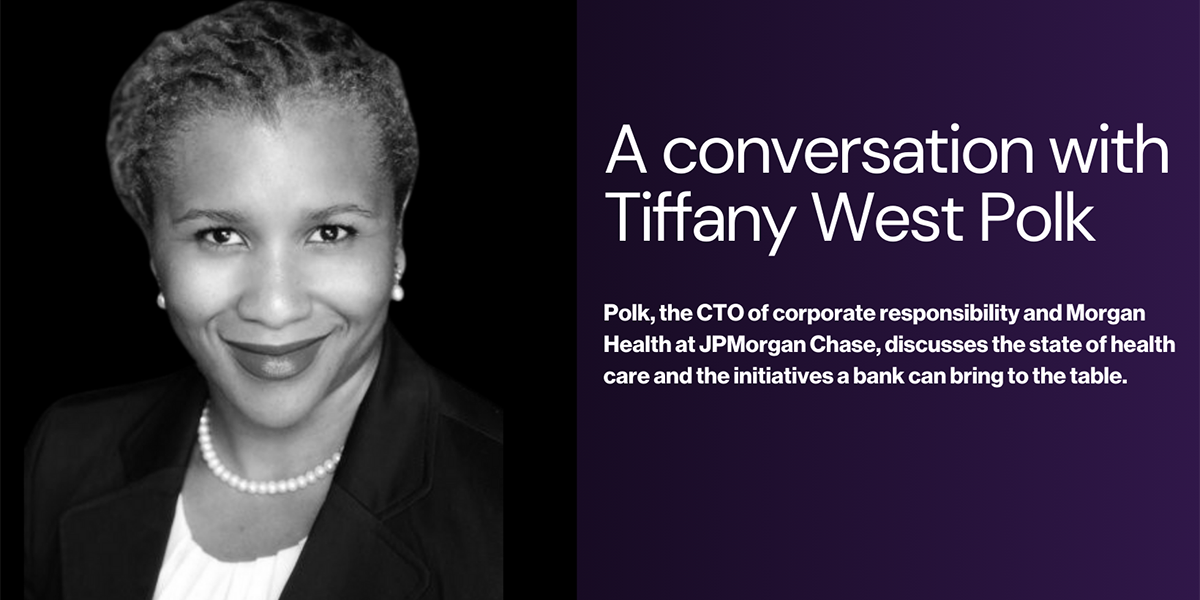Building a data-driven health-care ecosystem

To spark innovation by identifying gaps and pain points in the employer-based health-care system, JPMorgan Chase launched Morgan Health in 2021. Morgan Health’s chief technology officer of corporate responsibility, Tiffany West Polk, says Morgan Health is driven to improve health outcomes, affordability, and equity, with data at its foundation. Gaining insights from large data streams means optimizing analytical platforms and ensuring data remains secure, while also HIPAA and Health Resources and Services Administration (HRSA) compliant, she says.
Currently, Polk says, the U.S. health-care system seems to be “quite stuck” in terms of keeping health-care quality and positive outcomes in line with rising costs.
- “If you look across the broader U.S. environment in particular, employer sponsored insurance is a huge part of the health-care net for the United States, and employers make significant financial investment to provide health benefits to their employees. It’s one of the main things that people look at when they’re looking across an employer landscape and thinking about who they want to work for.”
Investing in new ways to provide health care
Nearly 160 million people in the U.S. have employer-sponsored health insurance as of 2022, according to health-care policy research non-profit KFF (formerly the Kaiser Family Foundation). JPMorgan Chase launched Morgan Health because of its focus on improving employer-sponsored health care, not least for its 165,000 employees.
Morgan Health has invested $130 million in capital during the past 18-plus months in five innovative health-care companies: advanced primary care provider Vera Whole Health; health-care data analytics specialist Embold Health; Kindbody, a fertility clinic network and global family-building benefits provider; LetsGetChecked, which creates home-monitoring clinical tools; and Centivo, which provides health care plans for self-insured employers.
All of these companies offer new approaches to conventional employer-sponsored health care to deliver a higher standard of care. Morgan Health’s collaboration with these enterprises will examine how these change patient outcomes, health-care equity, and affordability, and how to scale their successes.
“Many Americans today face real barriers to receiving high-quality, affordable, and equitable health care, even with employer-sponsored insurance,” Polk says. This calls for breaking the paradigm of delivery-incentivized health care, she says, which rewards providers for delivering services, but pays insufficient attention to outcomes.
- “We have a model today where our health-care providers are incentivized based on the number of patients they see or the number of services they perform. What that means is that they’re not incentivized based on improvements, patient’s health, and wellbeing. And so when you have a model that thinks volume versus value, those challenges then serve to compound the disparities that we have. And that then also means that those who have employer-sponsored insurance are also similarly challenged.”
For Morgan Health, AI and machine learning (ML) will be a key to problem-solving with health-care technology, Polk says. AI is ubiquitous across industries, and is the go-to when we think about innovation, she says, but the hype can mean we forget about the importance of data accessibility and quality.
Polk says solving this data challenge makes this an exciting and transformational time to be a chief technology officer and a technologist. The next stage of evolution in health care can’t proceed without better data, Polk says, and this is what the data and analytics team at Morgan Health are addressing.


